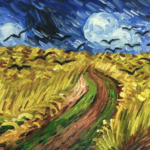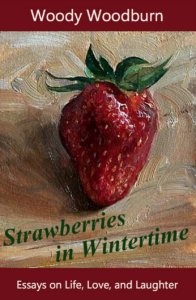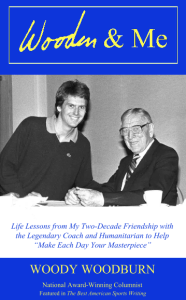 FOLLOW ME ON INSTAGRAM: @woodywoodburn
FOLLOW ME ON INSTAGRAM: @woodywoodburn
*
Our Hands Linked,
Even If Only Virtually
Ventura County is rightly renowned for its strawberry fields. But my hometown also makes me think of wheat—specifically, a wheat field in a tiny farm town in Ohio.
The story goes like this:
A young girl wandered from home and became lost in the family’s wheat field that had grown taller than she. Her parents called out her name repeatedly, searched frantically, but could not find her.
Soon her three siblings, then neighbors as well, joined the hunt. But as daylight dimmed and disappeared, the little girl still had not been found.
By now seemingly half the townspeople were hectically racing through the wheat field trying to find the little girl, but with no success. The wheat field was simply too vast.

“Wheat Field With Crows” by Vincent van Gogh.
Night fell and with it the temperature. If the little girl was not found soon, she would surely perish from hypothermia. At long last, her father called everyone in from the wheat field.
No, he had not given up on finding his dear daughter. Rather, he had an idea. He gathered all the volunteers together and had them join hands to form a long human chain. More accurately, they formed a human comb.
They then walked together, side by side by side, combing through the tall amber waves of grain. In this manner they did not miss a single area as had happened when they randomly searched separately.
Within ten minutes, the search party of more than one hundred individuals – now united as one – found the little girl curled up on the ground …
… shivering and trying to stay warm, but still alive.
In a grander sense, it seems to me, the wheat field represents Ventura County – and even the world – most especially during challenging times like these COVID-19 “stay-at-home” days and nights.
All of us figuratively get lost at times and need the help of others. Our local healthcare professionals, restaurant staffs providing takeout meals, pharmacy and grocery workers, Instacart shoppers and retirement home caregivers, and so many more are now linking hands on the front lines, so to speak, to help the rest of us.
The rest of us, in turn, by “sheltering-in-place” as asked are figuratively linking hands to help keep our most vulnerable citizens – those over age 65, those with compromised immune systems, those with asthma – as safe from coronavirus as possible. Additionally, many in our “human comb” are further helping our small businesses by ordering takeout meals or having other products delivered to our homes.
Here is what else I see in our “wheat field.” I see people “social distancing” as advised, yet still “connecting” with others with a smile and a wave outside from safely afar or though a window; with phone calls, emails and video chats; with Facebook, Instagram and Twitter.
With our hands linked, virtually, we will eventually emerge from this current wheat field challenge. Perhaps we will be shivering, as though having stayed in the ocean too long; but, as if wrapped in a beach towel, we will quickly warm up again.
When this frightening moment in history passes and the warmth of normal returns, and with it the warmth of real hugs replacing virtual ones, I hope we will be better because it.
Correction. I am convinced we will be better because if it.
Already, I believe, we are seeing one another – from doctors and nurses to grocery workers and pizza delivery drivers, from co-workers and neighbors to the elderly and shut-ins – with a new appreciation.
Yes, when I think of the wheat field story, the new soundtrack is by Beatles: “Strawberry Fields Forever.”
* * *
Woody Woodburn writes a weekly column for The Ventura County Star and can be contacted at WoodyWriter@gmail.com. Follow him on Twitter and Instagram at @woodywoodburn. His books are available at www.WoodyWoodburn.com.

 Check out my memoir WOODEN & ME: Life Lessons from My Two-Decade Friendship with the Legendary Coach and Humanitarian to Help “Make Each Day Your Masterpiece” and my essay collection “Strawberries in Wintertime: Essays on Life, Love, and Laughter” …
Check out my memoir WOODEN & ME: Life Lessons from My Two-Decade Friendship with the Legendary Coach and Humanitarian to Help “Make Each Day Your Masterpiece” and my essay collection “Strawberries in Wintertime: Essays on Life, Love, and Laughter” …
- Personalized signed copies are available at WoodyWoodburn.com

